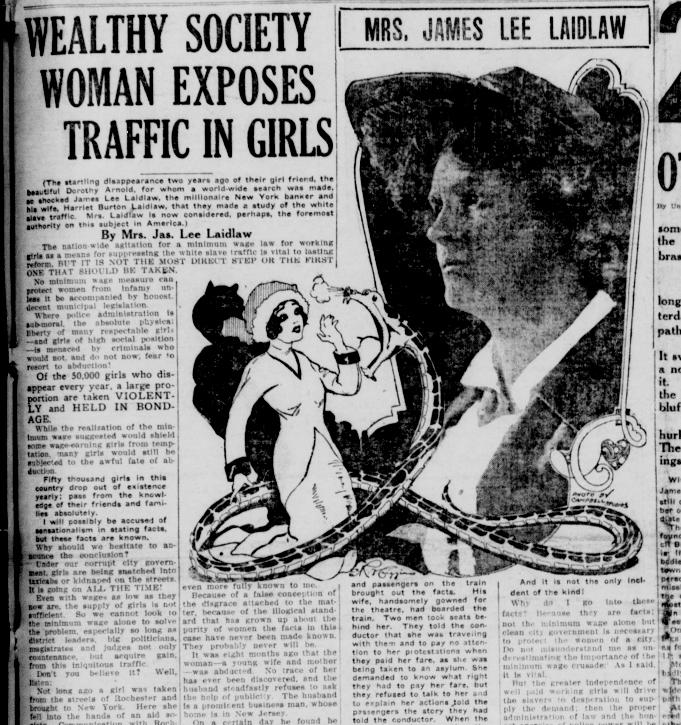|
Moderated by NW Okie! |
Volume 15 , Issue 122013Weekly eZine: (374 subscribers)Subscribe | Unsubscribe Using Desktop... |
1913 - Wealthy Society Woman Exposes Traffic In Girls

It was in that same 24 March 1913, Monday, Seattle, Washington newspaper the the following headline read: "Wealthy Society Woman Exposes Traffic In Girls." It was the startling disappearance 2 years ago (1911) of the beautiful Dorothy Arnold, that shocked James Lee Laidlaw, the millionaire New Yorker banker and his wife, Harriet Burton Laidlaw, that they made a study of the white slave traffic. Mrs. Laidlaw was then after considered the foremost authority on the subject in America.
The nation-wide agitation for a minimum wage law for working girls was a means for suppressing the white slave traffic was vital to lasting reform, but it was not the most direct step for the first one that should be taken.
No minimum wage measure could protect women from infamy unless it be accompanied by honest, decent municipal legislation.
Where police administration was sub-moral, the absolute physical liberty of many respectable girls, and girls of high social position, was menaced by criminals who would not, and did not, fear to resort to abduction.
Back then, in 1913, of the 50 thousand girls who disappeared every year, a large proportion were taken violently and held in bondage.
While the realization of the minimum wage suggested would shield some wage-earning girls from temptation, many girls would still be subjected to the awful fate of abduction.
Fifty thousand girls in this country dropped out of existence yearly, and passed front he knowledge of their friends and families absolutely.
Mrs. Laidlaw reported in 1913, "Under our corrupt city government, girls are being snatched into taxicabs or kidnaped on the streets. It is going on all the time."
With wages as low as they were then, the supply of girls was not sufficient. So they connote look to the minimum wage alone to solve the problem, especially so long as district leaders, big politicians, magistrates and judges not only countenance, but acquire gain, from this iniquitous traffic.
It was back then that a girl was taken front he streets of Rochester and brought to New York. Here she fell into the hands of an aid society. Communication with Rochester proved that the police there were looking for her and her family was distracted. It was only by chance that she was saved from a terrible fate.
Because of a false conception of the disgrace attached to the matter, because of the illogical standard that has grown up about the purity of women the facts in this case have never been made known, and were reported probably never would be.
It was eight months ago (September, 1913) that the woman, a young wife and mother, was abducted. No trace of her had ever been discovered, and the husband steadfastly refuses to ask the help of publicity. The husband was a prominent business man, whose home was in New Jersey.
ON a certain day he found he had some leisure and telephoned his wife to come over and attend the theatre with him. He was a little late in arriving to meet the train on which she left her home town, and he did not find her.
Inquiry among the conductor and passengers on the train brought out the facts. His wife, handsomely gowned for the theatre, had boarded the train. Two men took seats behind her. They told the conductor that she was traveling with them and to pay no attention to her protestations when they paid her fare, as she was being taken to an asylum. She demanded to know what right they had to pay her fare, but they refused to talk to her and to explain her actions told the passengers the story they had told the conductor. When the train reached the station the conductor saw the woman hurried away between the men. No one ever saw her again. Her husband had no doubt of her fate, nor can anyone question his belief.
It is not the minimum wage alone, but the clean city government was necessary back then to protect the women of a city. But do not misunderstand, or underestimate the importance of the minimum wage crusade. It is vital, also.
The greater independence of well paid working girls would drive the slavers to desperation to supply the demand. The proper administration of law and the honest exercise of police, power would be absolutely necessary to guard women from forcible slavery.
| View or Add Comments (0 Comments)
| Receive
updates ( subscribers) |
Unsubscribe
| © . Linda Mcgill Wagner - began © 1999 Contact Me | |
